Alex Wilcox sceglie di rompersi in mille pezzi e racconta la propria metamorfosi sonora con “Identity Crisis”, un album su BPitch che unisce techno berlinese, punk elettronico e introspezione radicale
Alex Wilcow: la techno berlinese, il punk elettronico e le ombre dell’IDM con la stessa intensità di una confessione notturna. Dietro il muro di bassi e distorsioni, c’è una biografia fatta di geografie sonore e cambiamenti.
Nato a Dallas, cresciuto tra le chitarre e l’energia scomposta del rock, Wilcox ha poi affinato il suo linguaggio nei corridoi levigati degli studi di Hollywood, prima di perdersi — e ritrovarsi — tra Detroit e Berlino. Immerso nell’estetica militante di Underground Resistance, ha imparato che la musica può essere un atto politico, ma anche un gesto intimo, vulnerabile, necessario.
“Identity Crisis” è tutto questo: un disco che vibra di contraddizioni, quelle naturali e non ricercate artificialmente. I beat si gonfiano e si frantumano, i synth si torcono in spirali emotive, le melodie sfuggono a ogni etichetta. Wilcox descrive il suo lavoro come “existential dread in audio form” — e in effetti, l’album suona come una crisi che diventa linguaggio, una catarsi tradotta in frequenze.
Ogni brano è una soglia: techno che urla, funk che balugina, IDM che si spezza come vetro. Ma dietro la costruzione meticolosa si nasconde un’anima punk, inquieta e sincera. Wilcox non vuole compiacere: vuole esistere, e farci sentire il peso (e la bellezza) di quell’esistenza. Lo fa con la sua musica e con questa intervista, nuda e cruda, da leggere tutta d’un fiato.
Perché in un panorama elettronico saturo di superfici levigate, Alex Wilcox sceglie la frattura, la vulnerabilità. Identity Crisis non offre risposte, ma invita all’ascolto radicale, a guardarsi dentro. Buona lettura!
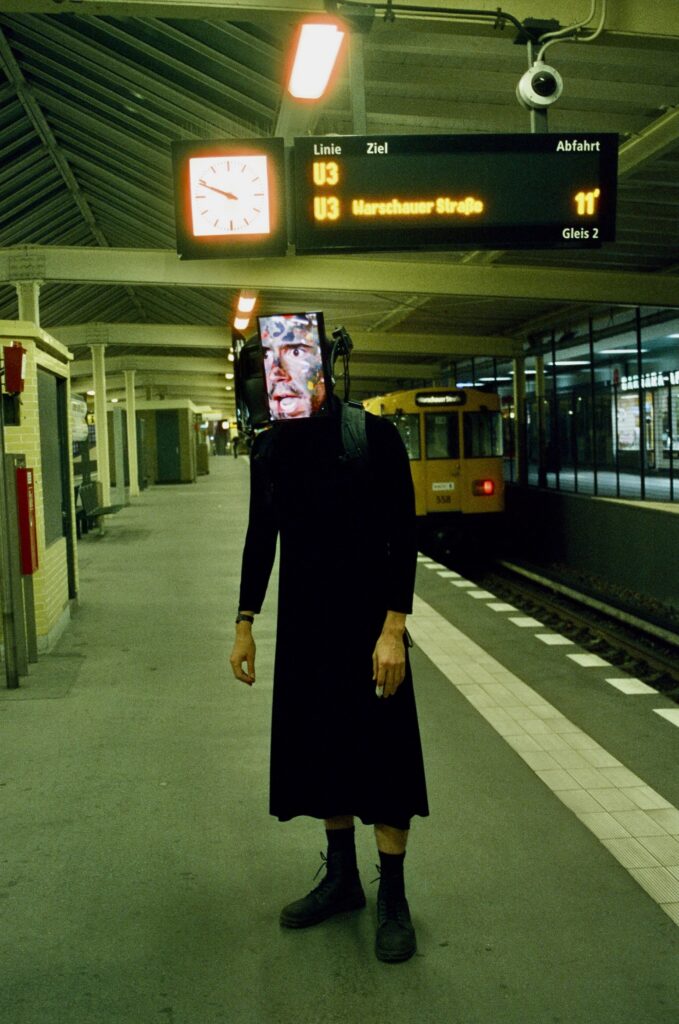
Ciao Alex, benvenuto su Parkett è un piacere averti con noi. Partirei dal tuo nuovo album, uscito questo weekend su Bpitch. “Identity Crisis” è un mix esplosivo di energia punk, techno distorta, svolte IDM e introspezione emotiva. Cosa ha ispirato un album così sfaccettato e difficile da incasellare nei generi?
Diversi fattori. Man mano che sono diventato più “professionale” e ho imparato a conoscere meglio i protagonisti della scena, mi sono sentito sempre più disgustato dalla mancanza di ambizione musicale e dal fatto che persone che non sono musicisti “abbiano successo” commercialmente pur offrendo pochissimo per far evolvere il genere “techno”.Inoltre, mi annoiavo spesso nei club – trovavo la musica stantia, priva di ispirazione e troppo basilare.
Volevo esplodere interiormente nel club, e credo che parte della musica che faccio mi porti proprio in quello stato. Voglio creare brani che possano far ballare, ma che allo stesso tempo trasmettano una varietà di emozioni.Non mi piace che la musica da club venga spesso trattata come qualcosa di inferiore – intendiamoci, molta lo è davvero, ma non è un limite intrinseco del genere: semplicemente serve più buona musica. O forse non sto sentendo quella giusta. Per me, innovare nel mio campo è fondamentale: combinare generi e atmosfere diverse per creare qualcosa di nuovo è il cuore di ciò che faccio.
Hai descritto l’album come un “diario musicale arrabbiato” pieno di “angoscia esistenziale in forma sonora”. Quanto della tua esperienza personale ha influenzato il processo creativo?
Questa musica sono davvero io. È difficile parlarne senza scivolare nella pseudo-psicologia, ma sì – quando produco provo emozioni molto intense, e credo che si senta nei brani.
Il disco attinge da influenze che vanno dal punk all’industrial, dall’electroclash al trip-hop. Cosa ti spinge a scomporre e ricombinare i generi? Questa “caoticità stilistica” è una forma di ribellione?
Sono meno interessato ai generi e più agli artisti. Quando studio la musica, ascolto e analizzo ciò che mi piace: Air, Kendrick Lamar, Frank Ocean, Skrillex, Boards of Canada, The Other People Place… tantissimi altri. È naturale che, imparando da loro, provi a integrare alcune delle loro idee nella mia musica.Ora ho una carriera che ruota intorno alla musica da club e alla scena techno, quindi cerco di prendere spunti da altri mondi musicali, ma assicurandomi che i bassi spingano – così la gente si esalta comunque in pista. Finché riesco a innovare, mi sento a mio agio in questo spazio elettronico.
Il singolo principale, “I HATE ALL OF YOU”, prende in giro la cultura dei DJ moderni. Cosa pensi della scena elettronica attuale? E dove senti che si colloca la tua musica?
È assolutamente spazzatura.Uno degli aspetti migliori del passare alle esibizioni dal vivo è che non devo più dire “sono un DJ”. Ovviamente ci sono DJ molto talentuosi, ma sono una minoranza minuscola – anche a livello professionale. La maggior parte di loro non ha talento e magari crede pure di averlo, ma non ha idea di quanto sia difficile creare un’opera d’arte che valga la pena condividere. Imparare a fare un set techno decente richiede due settimane. Imparare a produrre un brano professionale, anche solo discreto, spesso richiede anni. Fare un grande brano, davvero grande? Dai su.
C’è un motivo se esistono un miliardo di DJ. Dove si colloca la mia musica in tutto questo? In parte non sta a me dirlo, ma spero che venga vista come qualcosa di innovativo, che porta nuovi suoni e sensazioni nei club, che mette la musica al primo posto e che ha sostanza. Non abbiamo bisogno dell’ennesimo DJ che venera la techno anni ’90. Ti prego, uccidimi. La techno anni ’90 è figa, ma santo cielo, è il 2025. Andate a casa.La nostalgia cieca nella techno è irritante. Spero di muovermi in una nuova direzione, aprendo nuove strade per il genere. Mi sembra che a pochi importi davvero della musica in questo ambiente – alcuni mi hanno persino detto di non pubblicare un album, “tanto alla gente non interessano più gli album”. Ma a me sì. Il mio obiettivo è fare qualche disco che diventi un classico.
Sei arrivato a Berlino passando da Dallas, Hollywood e persino Detroit, dove hai lavorato con Underground Resistance. Come hanno influenzato questi luoghi e le loro storie musicali la tua identità artistica?
Potrei scriverci un libro.In breve – o forse non tanto breve – ho iniziato imparando blues, rock, funk e molto alternative rock a Dallas. Suonavo in band lì – praticamente veneravo i Red Hot Chili Peppers, in particolare John Frusciante, e mi sono immerso completamente nella chitarra. Non ho davvero “lavorato” con Underground Resistance, più che altro avevo accesso ai loro studi di tanto in tanto, ho conosciuto alcuni membri, ricevuto consigli da Mike Banks – cosa che è stata fantastica.
Mi sono sentito molto affine a lui, soprattutto nel modo in cui mette la musica al di sopra di tutto. La musica è ciò che conta.Scrivendolo ora mi sento quasi romantico… più divento professionale, meno vedo questo spirito. Lavorare a Hollywood in uno studio di una major – il Chalice – è stato utile per vedere come lavorano i grandi con un sacco di soldi.Ho capito che a quel livello nessuno si preoccupa dell’hardware. Ti serve solo un laptop, davvero.
BPitch ha una lunga eredità nella scena techno, eppure il tuo album va ben oltre le convenzioni del club. Come è nata la collaborazione con l’etichetta e quanta libertà creativa hai avuto?
Si, BPitch ha una forte identità techno – ma è anche stata una piattaforma per artisti molto unici, come Paul Kalkbrenner e Modeselektor. Sono due dei miei preferiti nel mondo “techno/club”, e i loro primi dischi uscivano proprio su BPitch. Così ho conosciuto l’etichetta. Ho iniziato a mandare loro demo nel 2018 – persino spedendo una matrioska con una chiavetta USB dentro.

Non erano interessati. A fine 2021 ho pubblicato un disco che Ellen Allien ha iniziato a suonare. Ho risposto alla vecchia mail dicendo: “yo, ho altra musica”. Da lì è nata un’uscita sulla sua sotto-etichetta UFO, e poi siamo arrivati a questo album. Penso che abbia perfettamente senso che BPitch lo pubblichi, considerando i loro lavori passati.Pensa a Hello Mom! o Happy Birthday dei Modeselektor – album fantastici, con qualche traccia techno per DJ, ma anche pezzi di generi diversi. Ho avuto molta libertà creativa: ho scelto la tracklist finale, curato l’artwork e realizzato i video.Ne sono felicissimo – non voglio più fare grandi compromessi sulla mia musica. Quelli la uccidono.
C’è un brano nell’album a cui ti senti particolarmente legato, o che rappresenta meglio dove sei ora – emotivamente o artisticamente?
Le tracce sono come figli per me, le amo tutte.Dipende dal giorno.Preferisco non rispondere del tutto a questa domanda – è meglio che gli ascoltatori non sappiano cosa penso io.
Il titolo “Identity Crisis” suggerisce una riflessione profonda sull’identità personale e artistica. Dopo questo progetto, ti senti più definito come artista o più frammentato?
Come sopra.Forse tra qualche anno parlerò più apertamente del perché si chiama Identity Crisis.Ma siccome l’album esce proprio oggi, preferisco che gli ascoltatori lo interpretino a modo loro.In
In un’epoca in cui la musica elettronica punta spesso su produzioni lucide e orientate al mercato, il tuo album suona grezzo, viscerale, quasi artigianale. È una scelta consapevole e come ti collochi rispetto alle leggi dettate dal mercato discografico oggi?
Cioè – perché dovrei voler fare una “produzione lucida e orientata al mercato”?Questo album è artigianale: l’ho prodotto, mixato e masterizzato da solo.Odio che non sia la norma.Che mondo è quello in cui questa non è la norma?La gente finge che la techno sia underground, eppure la tua domanda è più che legittima – e il fatto che lo sia, mi rattrista.Qual è lo scopo della musica?Io ci tengo davvero, e credo che il compito di un musicista sia migliorare costantemente nella propria arte e realizzare opere che esprimano una visione o un’emozione autentica – diretta o indiretta che sia.
Se volessi fare musica di mercato, tanto varrebbe uccidermi. O cambiare mestiere.Se stai leggendo questo e fai musica techno, o qualsiasi altro genere – esercitati, migliora.I deficienti commerciali sono ovunque, è terribile – ma ricordati perché hai iniziato.Il nostro compito come artisti è spingerci oltre, ispirare attraverso ciò che raggiungiamo nella ricerca della perfezione.Non piegarti alla produzione orientata al mercato.Fai musica talmente buona che sia il mercato a inseguirti.Certo, se devi guadagnarti da vivere mentre insegui la tua grandezza musicale, non ti biasimo. Ma comunque.Se non hai intenzione di contribuire davvero all’evoluzione del genere, cambia mestiere.
Guardando al futuro, come immagini l’evoluzione della musica elettronica? C’è qualcosa che vorresti cambiasse radicalmente?
Non lo so. Vorrei che i musicisti straordinari, invece dei marketer e degli influencer, avessero più visibilità – ma probabilmente non succederà.Cerco solo di concentrarmi sul mio percorso: rendere la mia musica e i miei live show il meglio possibile, e sperare di alzare un po’ l’asticella.Sto anche pensando di organizzare più eventi e collaborare con persone affini.
Ho organizzato la mia prima festa a Berlino qualche settimana fa – ho invitato BBBBBBB, un duo giapponese folle con cui ho pubblicato un EP. Sono pazzeschi. È stato bello dar loro spazio.Voglio più gente come loro nei club.Man mano che cresco, mi piacerebbe aiutare artisti come loro, o come Hypnosis Therapy, a emergere.Vorrei contribuire a normalizzare l’ingresso nei club di artisti nuovi, appassionati, che fanno musica innovativa e rendono i locali interessanti.
Non serve un altro milione di DJ che suonano le stesse tracce.Voglio più artisti dal vivo – è più difficile fingere talento quando suoni live.Ma non basta essere live: la musica deve anche essere audace.Abbiamo bisogno di più persone autentiche nella scena. Vedremo.Grazie per l’interesse verso l’album.
Grazie a te !
Scopri “Identity Crisis” qui
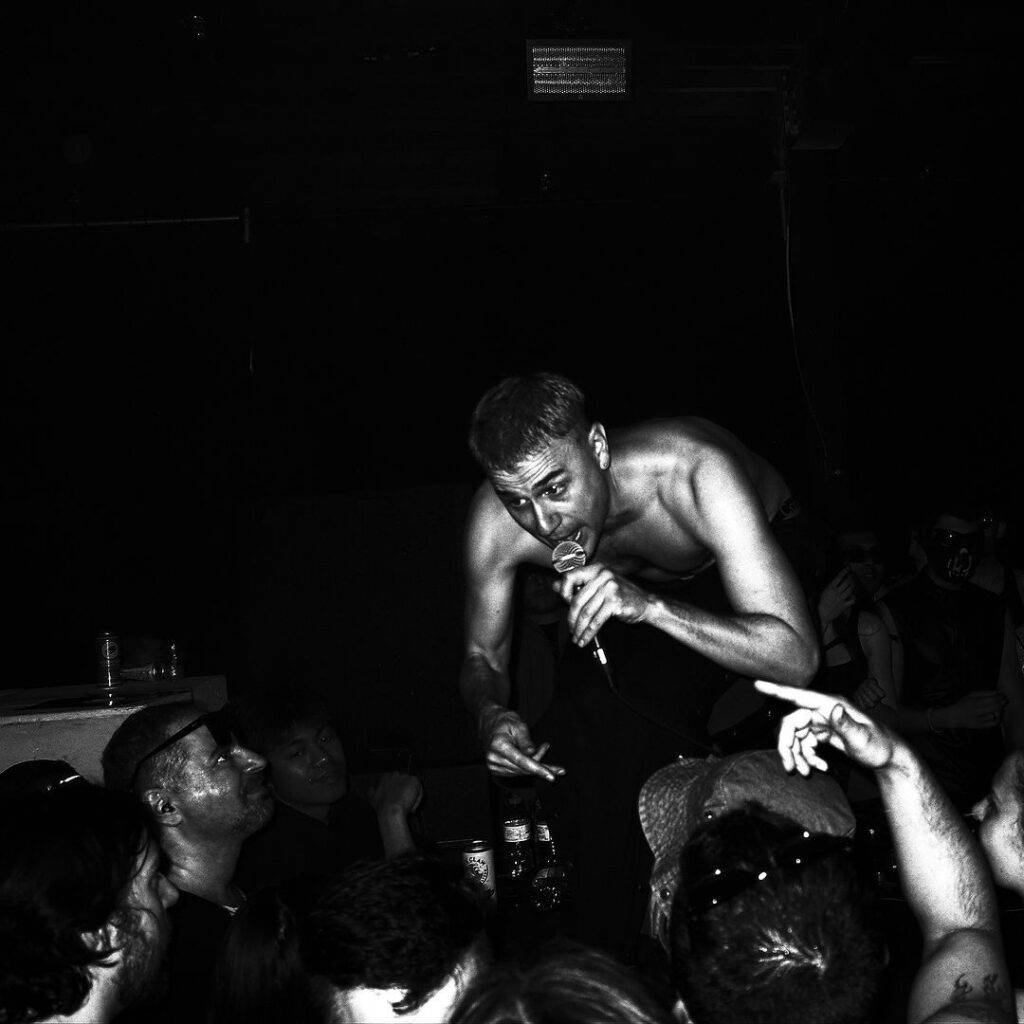
ENGLISH VERSION
Alex Wilcox chooses to break himself into a thousand pieces and narrates his own sonic metamorphosis with Identity Crisis — a BPitch release that fuses Berlin techno, electronic punk, and radical introspection.
Wilcox moves through Berlin’s techno pulse, the raw energy of electronic punk, and the shadowy echoes of IDM with the intensity of a midnight confession. Behind the wall of bass and distortion lies a biography shaped by shifting geographies and restless transformation.
Born in Dallas and raised amid guitars and the unruly energy of rock, Wilcox later refined his craft within the polished corridors of Hollywood’s recording studios, before losing — and finding — himself again somewhere between Detroit and Berlin. Immersed in the militant ethos of Underground Resistance, he learned that music can be both a political act and an intimate gesture — vulnerable, necessary, and profoundly human.
“Identity Crisis” is all of this: a record that vibrates with contradictions—natural ones, not artificially crafted. The beats swell and shatter, the synths twist into emotional spirals, the melodies slip through every label. Wilcox describes his work as “existential dread in audio form”—and indeed, the album sounds like a crisis turning into language, a catharsis translated into frequencies.
Every track is a threshold: techno that screams, funk that flickers, IDM that breaks like glass. Yet behind the meticulous construction lies a punk soul—restless and sincere. Wilcox isn’t trying to please anyone; he wants to exist, and to make us feel the weight (and the beauty) of that existence. He does it through his music, and through this interview—raw, unfiltered, meant to be read in one breath.
Because in an electronic landscape saturated with polished surfaces, Alex Wilcox chooses fracture, vulnerability. “Identity Crisis” doesn’t offer answers—it invites radical listening, a confrontation with the self. Enjoy the read.
Hi Alex, welcome to Parkett — it’s a pleasure to have you with us.Let’s start with your new album, which just dropped this weekend on BPitch. Identity Crisis is an explosive mix of punk energy, distorted techno, IDM twists, and emotional introspection. What inspired such a multifaceted album — one that’s so hard to pin down to a single genre?
Several things. As I’ve gotten more “professional” and learned more about the players and people in the scene, I’ve become increasingly disgusted with the lack of muscial ambition and non-musicians “succeeding” commercially while offering very little to advance the genre of “techno.” I also just used to be bored a lot at the clubs – I thought the music was stale, lacked inspiration, and was basic. I wanted to explode internally in the club, and I think some of the music I make brings me into that state of being. I want to make stuff that can still bang in a club, but also bring forth a diverse emotional palette. I don’t like how club music is often treated as less-than – don’t get me wrong – a lot of it is exactly that, but that’s not something that is inherent to club music – there just needs to be more good stuff made. Or I’m just not hearing a lot of the good stuff. To me, innovating in my space is a key part of what I do – combining genres and moods and making something new is how that happens.
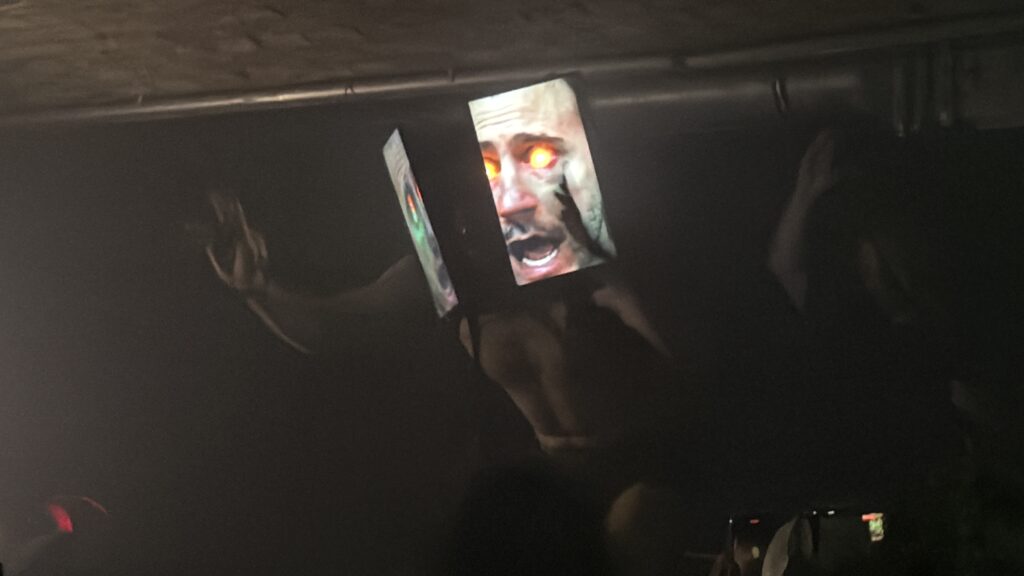
In your own words, you’ve described the album as an “angry musicaldiary” filled with “existential dread in audio form.” How much of yourpersonal experience and inner world shaped the creative process?
I mean – this music is very much me. It’s hard to go too deep without delving too much into pseudo-psychology. But yeah, I often feel very strongly when I produce, and you hear that in the audio.
The record draws from a wide range of influences — punk, industrial,electroclash, trip-hop. What attracts you to breaking down andrecombining these genres? Is this stylistic chaos a form of rebellion?
I’m generally less interested in genres, and more interested in artists. When I’m studying music, I’m listening to and dissecting music that I like. I like Air, Kendrick Lamar, Frank Ocean, Skrillex, Boards of Canada, the Other People Place….so many other artists. So it’s natural that as I learn their musical ideas, I try and implement them into my own music. I’ve now got a bit of a career giong in club music/the techno scene, so I try and utilize stuff from other areas of music, and just make sure the low end slaps – thus people still feel hype hearing it in a club. As long as I can try to innovate I feel pretty okay operating in this electronic music space.
The lead single, “I HATE ALL OF YOU,” takes a satirical stab atmodern DJ culture. What’s your view of the current electronic scene?Where do you feel your music sits within — or outside — it?
It’s absolute garbage. One of the best parts of moving into more live performance is being able to no longer say “I’m a DJ.” Of course, there are some very talented DJ’s who this doesn’t apply to, but that’s an insanely small minority – even in the professional world. Most of these people are talentless people who might actually believe they’re talented – but don’t have any idea how hard it is to actually make a piece of art worth sharing. Learning how to play a competant, passable techno set takes like 2 weeks. Learning how to make a decent, professional sounding track, not even a great track, often takes years. Making an actually great piece of music? C’mon now. There’s a reason there’s a billion DJ’s.Hmmmm…..where does my music sit within it?
Part of that’s not really up to me – but I hope I would be viewed as someone who’s innovating, bringing new sounds and feelings into the clubs, is music-first, and is substantive. We don’t need another DJ worshiping 90’s techno. Please kill me. 90’s techno is cool, but jesus-christ, it’s 2025. Go home. The nostalgia worship in techno is incredibly annoying. I would hope I sit in a new lane of someone trying to push open new avenues of the genre. It seems like people don’t care about music that much in this space – I was even told by people not to release an album, people don’t care about albums anymore. But I do – my whole point of doing this music thing is to make a few classic albums.
You’ve come to Berlin by way of Dallas, Hollywood, and even Detroit,working with Underground Resistance. How have these places — and theirrespective musical histories — shaped your artistic identity?
I could write on this forever. Long-story short, though it won’t be so short, is that I started learning blues, rock, funk, and a lot of alternative rock in Dallas. I played in bands there – I basically worshipped the Red Hot Chili Peppers – particularly John Frusciante, and got very deep into guitar playing. I didn’t really “work” with Underground Resistance – it’s more that I was able to work in their studios from time-to-time, got to know some of the guys, got some advice from Mike Banks, and that was cool.
I felt a lot in common with Mike in particular – in the sense that he places such a high value on the music. The music is what matters. I’m feeling romantic as I write about this…it feels like as I get more and more professional I see less and less of this. Working in Hollywood at a major label studio – Chalice – was nice because I got to see how the ultra-high-money people work. I realized no one cares about hardware in that world. I realized that yeah, you really really do just need a laptop.
BPitch has a strong legacy in the techno world, yet your album boldlypushes beyond club conventions. How did your relationship with the labelcome about, and how much creative freedom did you feel in shaping thisrelease?
They do have a strong legacy in techno – but they’re also been a platform for several very unique artists – namely Paul Kalkbrenner and Modeselektor. Those are two of my favorite artists in this more “techno/club” world, and their early releases were on Bpitch. This is how I became aware of the label. I sent them demos since 2018 – even mailing them a Russian Doll with a USB inside.
They weren’t interested. End of 2021 I released a record that Ellen Allien started playing. I replied to the old email thread and was like “yo, I have more music.” And then we did a release on Ellen’s sub-label UFO, and eventually led to this album.
To me, them releasing this album makes sense given releases they’re done in the past. Take Modeselektor’s “Hello Mom!” or “Happy Birthday.” These are really sick albums, that have a handful of bangers techno DJ’s could play, but they also have tons of other tracks that span different genres. I had a ton of creative freedom – I was able to select final tracklist, do artwork, and make the music videos. I’m very happy about that – I don’t want to make big compromises anymore on my music. Those are death.
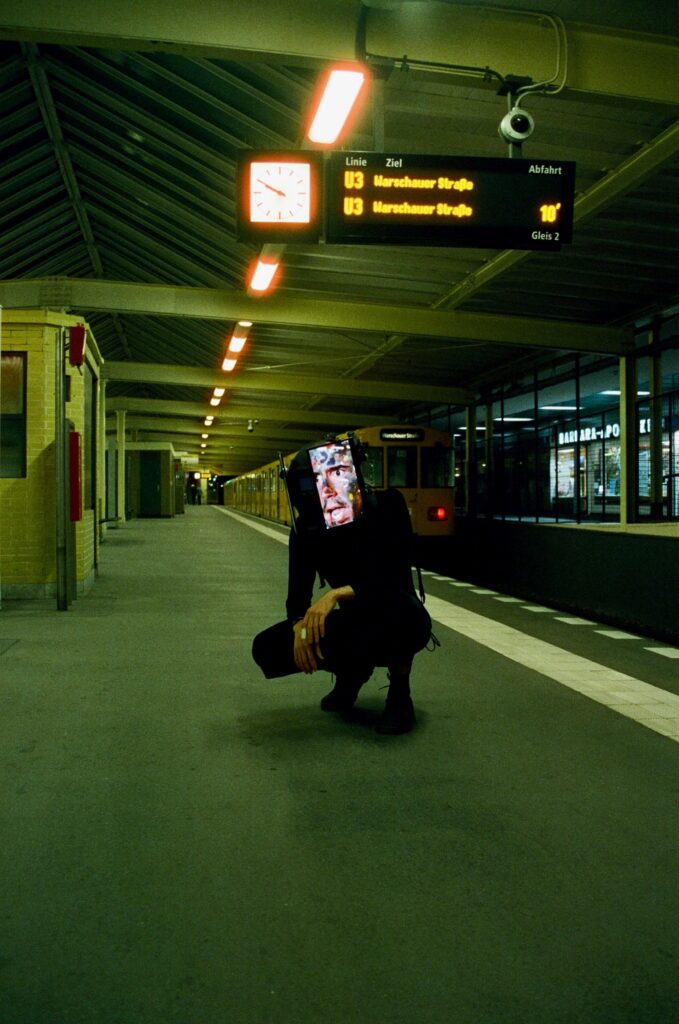
Is there a track on the album that you feel particularly connectedto, or that you feel best represents where you are right now —emotionally or artistically?
The tracks feel like my children, I really do love them all. Hmmm….it can change based on the day. I don’t want to answer this question so fully – better that listeners don’t know what I think.
The title “Identity Crisis” suggests a deep reflection on personal andartistic identity. Did you come out of this project feeling more definedas an artist — or more fragmented?
Same as above. Maybe in a few years I’d like to talk more about why it’s called “Identity Crisis.” But as the album is just coming out today I feel it’s better that the people listening take it as they want.
At a time when electronic music often focuses on polished, market-oriented productions, your album sounds raw, visceral, almost handcrafted. Was that a conscious choice, and how do you position yourself in relation to the rules dictated by today’s music industry?
I mean – why would I want to make some “polished, market-driven production?” This album IS handmade – I produced, mixed, and mastered it. I hate that this is not the standard. Fuck. What world are we living in right now? People pretend techno is underground, yet the question you pose me is a valid one. The fact that that is a valid question is sad to me. What’s the point of music? I really care about this shit, and the point of musician is to try their best to improve at their craft and execute a musical work at their highest capabilities – doing that means getting to understand their point of view, or an emotion that’s real to them – whether directly or tertiarily. If I wanted to make market-driven production I might as well just kill myself. Or get a different job. If you’re reading this and you’re in techno music, or any genre of music – go practice, and keep improving.
These commercial dipshits are everywhere, it’s horrible – but remember why you got into music in the first place. Our jobs as artists is to push our limits, inspire people with the heights that we hit in the pursuit of perfection – please don’t succumb to this market-driven production. Just make shit that’s so good that the market follows you. Of course, if you gotta make that paper, while you pursue your own greatness in music, I can’t fault you. But still. Fuck. If you’ve no intention to properly contribute to the advancement of the genre, then please go get a different job.
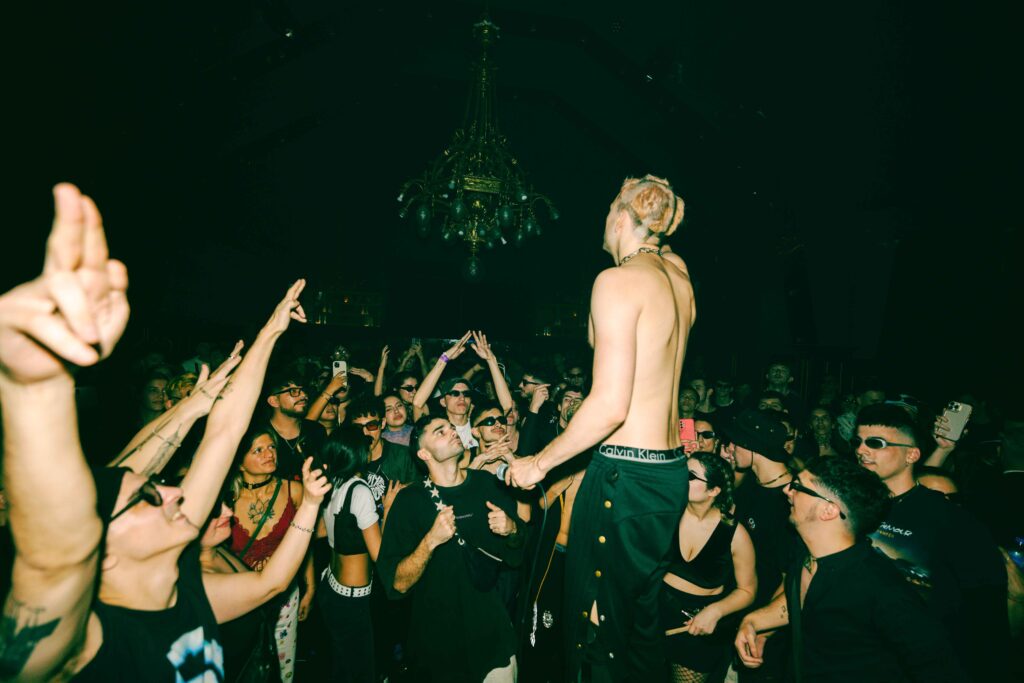
Looking ahead, how do you imagine the future of electronic music? Is there something you hope will shift radically — or something you hopestays exactly the same?
I don’t know. Sure, I wish that insane musicians, rather than marketers and influencers were better spotlit and shoved to the forefront, but if I had to guess, that’s probably not going to happen. I don’t know. I just try and focus on my own thing. I try and make my music and my live show as good as I can, and hope that in my small way I can try to raise the bar. I also am possibly going to be hosting more events, and working with more like-minded people.
I threw my first party in Berlin a few weeks back – brought out BBBBBBB, a wild Japanese duo that I released an EP with. They’re wild. Felt good to platform them. I want more people like them in the clubs. As I grow my platform, it would be cool for me to help people like them, also people like “Hypnosis Therapy”, to grow. I just want to help normalize bringing in new, cutting edge, artists who are passionate, driven, making new sounding music, and making clubs interesting. We don’t need another million DJ’s all playing the same tracks.
I want to see more live artists – it’s harder to fake talent when doing live. But not just live, their music also needs to be bold. We need more real ones in the scene. Yeah, let’s see. Thanks for taking the interest in the album.
Thank you
Discover “Identity Crisis” here

